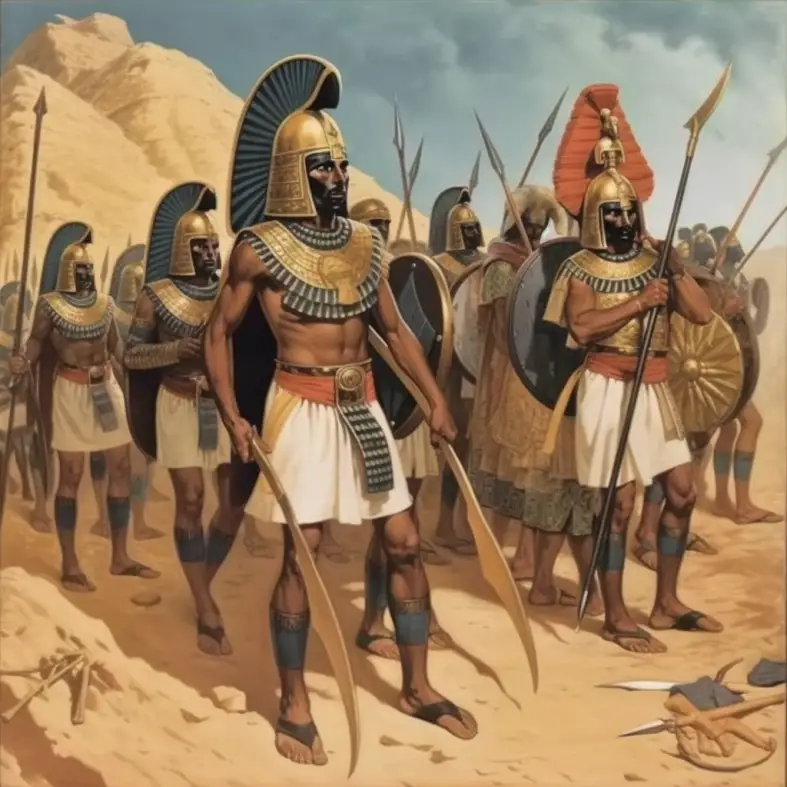Ancient Egyptian Army and Soldiers
Who led the Ancient Egyptian army?
The ruler of Ancient Egypt (the Pharaoh) was also the ruler of the army, even though they didn’t do much when wartime came.
Instead, they would appoint two generals in their place, to lead each half of the army in the north and south of Egypt.

The Egyptian army had three divisions: the Infantry (who fought on foot on the battlefield) the Chariotry (who fought in chariots on the battlefield) and the Navy (who fought at sea.)
Most pharaohs were highly trained in one of these styles of combat, but would commonly appoint their highly trained sons or brothers as generals in their place.
What was the life of an Egyptian soldier like?
The life of a soldier in Ancient Egypt was tough all the way from the very beginning.
Some began combat training at the age of five (though they couldn’t go to war until they were 20) and trained regularly to increase their strength and skill.
Compared to other ancient civilizations, the Egyptian army had a much greater emphasis on speed and agility; this is because they wore only leather armor, and were highly vulnerable to enemy weaponry.
Egyptian soldiers trained with multiple classes of weapons (swords, knives, spears, bows), and their position in the army would be chosen based on their best.
Archers were chosen from the most accurate shooters, while the quickest swordfighters would be sent instead to join the basic infantry.
This system meant that soldiers were always in the division that best suited their strengths; however, many would likely have trained hardest to become archers, as it was a safer position in wartime than being on the frontlines.
When Egyptian soldiers went to battle, they could be gone for months at a time. In return for this time and service, the Pharaoh rewarded his armies with treasure and land, and fighters were shown great respect by the common people.
How powerful were the armies of Ancient Egypt?
For most of its history, Ancient Egypt was ruled peacefully under the Pharaoh, which meant that the main concern for its army was repelling invaders.
The plains surrounding Egypt were populated by tribes of nomads (people who moved from place to place) who would sometimes try to raid the towns of the fertile Nile River valley.
Combat with these nomads was the most common conflict in Ancient Egypt, though battles with Roman and Islamic invaders also became frequent in the later years of the empire.
How were the cities of Egypt defended from invaders?
Though most Ancient Egyptian cities lacked strong walls or protective moats like those of Europe, fortresses were built along the borders east and west of the Nile, where the population was densest.
Small patrols of soldiers from these fortresses could stop minor attacks; but if a larger force invaded, more soldiers would be sent to join the fight.
Though many commoners had weapons (knives and swords were particularly common), they were given no training and were unable to defend themselves without outside assistance.
What did Egyptian soldiers do when they weren’t at war?
Since their training made them so strong, Ancient Egyptian soldiers were excellent laborers and farmworkers. The Egyptian army worked the fields during harvest time and also worked as builders for constructions like the Pharaoh’s palace, religious temples, and pyramids.
Facts about the Ancient Egyptian Soldiers and Military:
- The armies of Ancient Egypt were officially led by the country’s ruler, the pharaoh.
- However, the pharaoh rarely fought themselves; instead, they appointed two generals to stand in their place.
- Archers were the most important class of soldiers in the Egyptian army because bows were the most well-developed and commonly-used weapon in wartime. However, most archers would also carry swords with them for close-range defense.
- Although Egyptian soldiers started their training at the age of five, they weren’t officially allowed to take part in battle until they turned 20.
- A soldier’s army division was decided by their most skilled weapon – good archers became bowmen, good swordfighters became infantry, and good sailors joined the navy.
- Outside of wartime, many soldiers worked as manual laborers and farmed the Nile fields/built monuments in the name of their pharaoh. They weren’t paid well for this work but received rewards of land and treasure for successful military campaigns.
FAQ
Who officially led the Ancient Egyptian army?
The Pharaoh.
At what age did Egyptian soldiers start their training?
Five years old.
Why were archers so important in the Egyptian army?
Bows were the most common and well-developed class of weapons at the time of the Egyptian Empire. They were extremely important tactically and could be used in conjunction with the charity and navy to great effect.
What did soldiers do for work outside of wartime?
Worked as laborers and farmers, and sometimes served as protection for towns outside the army’s easy reach.
Which two empires did Egyptian armies often fight toward the end of the Egyptian Empire’s reign?
The Islamic and Roman Empires.



